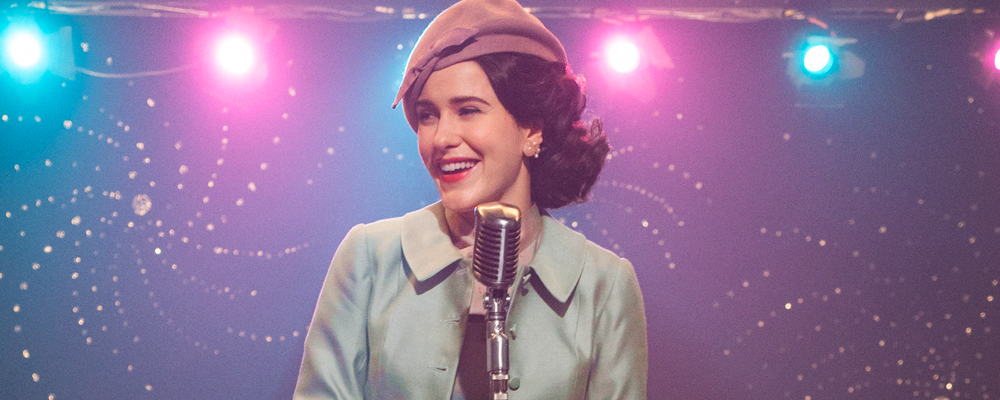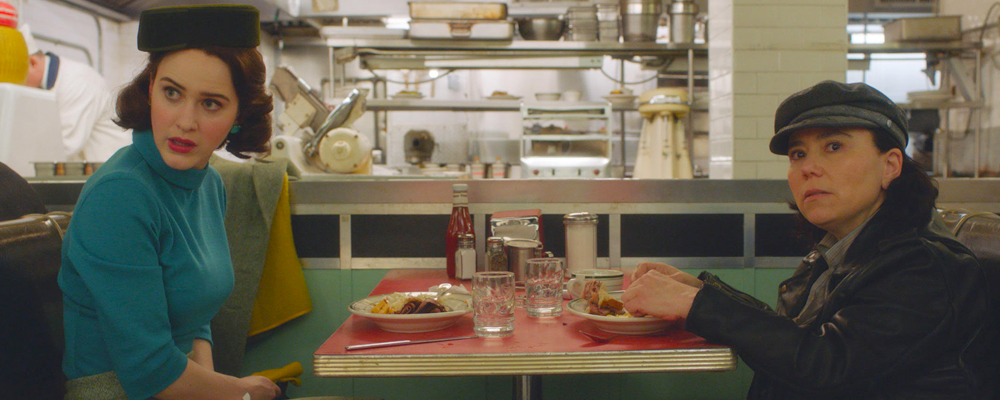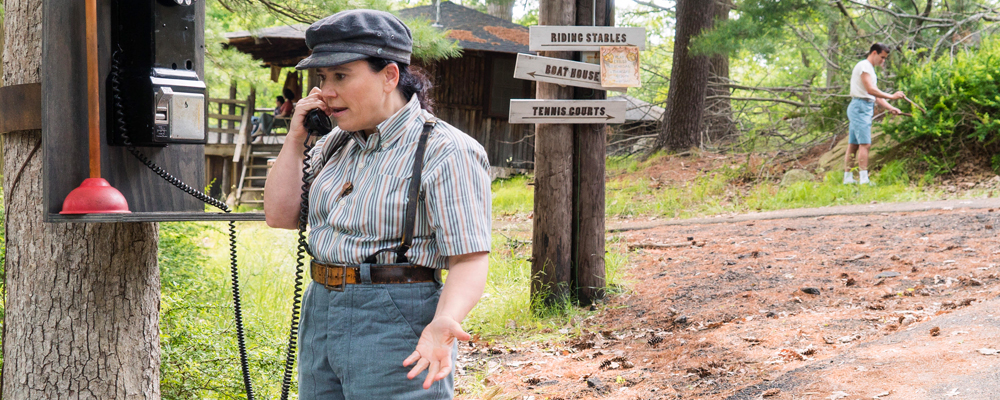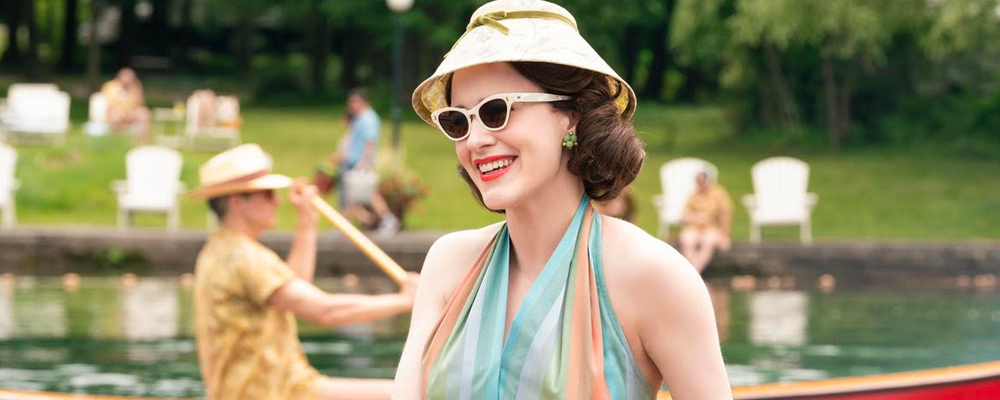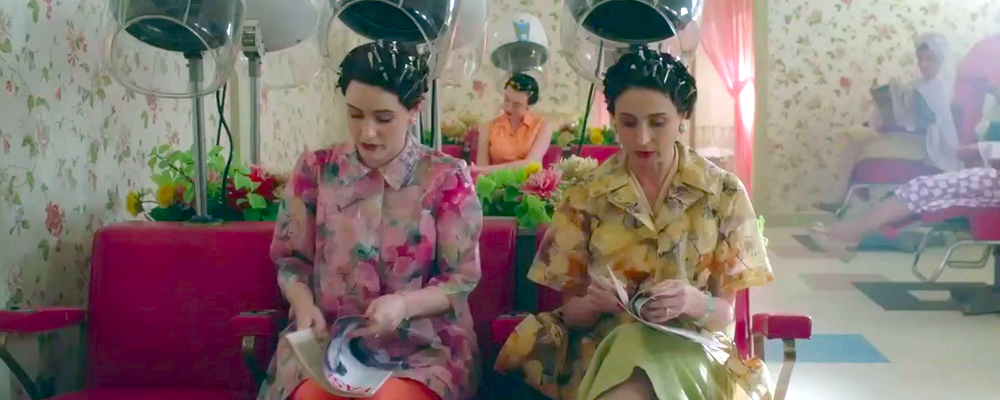‘The Marvelous Mrs. Maisel’ Season 2 Packs More Laughs and Deeper Drama
Alci Rengifo
“The Marvelous Mrs. Maisel” returns trailing clouds of glory. Amazon’s Emmy-winning masterpiece of high comedy and deep empathy has a special, universal effect that only gets better in its second season. Set in the 1950s, its characters are still perfectly relatable to us in their fears, hassles and dreams. Yet this is a great show about a woman seeking independence in an era even more patriarchal than today, when choosing an offbeat career path could only elicit scoffs. In this season Midge Maisel is forced out of the shadows, facing a braver choice when it comes to her natural talent for stand-up.
We open about a year since the events of the first season. Still doing comedy at the clubs on the side, Midge Maisel (Rachel Brosnahan) is still getting by with regular day jobs. First we see her as a telephone operator then she will transition to working at a makeup counter. Her true calling is the mic and stage, but Midge is still dealing with keeping her moonlighting secret from her parents, Abe (Tony Shalhoub) and Rose (Marin Hinkle). In the season premiere Rose has taken off to Paris, seeking a different air and environment and Abe and Midge go off to find her. Meanwhile Midge’s manager, Susie (Alex Borstein), has no doubts about pushing forward and fights to get Midge more gigs, even as the male-dominated lineups scoff and feel threatened by her blistering talent. Even while vacationing at the Catskills Steiner Mountain Resort, Midge somehow finds a way to sneak off and hit the limelight. Her life certainly gives her material, from her quirky parents to the continuing, complex relationship with her estranged husband, Joel (Michael Zegen). Their marriage a confirmed corpse, Joel is encouraged by his father Moishe (Kevin Pollak) to start talking to available women, but Joel pretends to be distracted by work. The truth is, deep down he still hasn’t gotten over Midge.
The first season of “The Marvelous Mrs. Maisel” was an exhilarating, comedic romp about a housewife, Midge, who essentially finds her comedic vocation by accident, following Joe’s infidelity with a secretary. While she remains the show’s center, this season also takes more time to give the supporting characters space to develop. Showrunners Amy Sherman-Palladino and Daniel Palladino enrich Midge’s world by giving us more of Abe, Rose, Moishe and Joel. The first two episodes are set in 1950s Paris as Midge and Abe absorb the local flavors and culture while trying to convince Rose to come back home to New York. We get more of a view into the dynamics of Abe and Rose’s marriage, and how Midge has inherited a funny combination of both of their personalities. Abe is the sharp intellectual professor while Rose is the lively half who feels the itch to leave the continent. Joel is also dealing with parental issues. Separated from Midge, he’s now living with his own parents again. There’s a scene with great timing as Joel glides through Moshe’s clothing assembly room, learning that even the company books are written in a combo of Yiddish and Aramaic (Jewish humor in this show is done with sharp gusto). Later on at Catskills a pretty girl will flirtatiously ask for bowling lessons with some hilarious one liners (“you’d like my turkey”), but Joel just can’t bring himself to cross the line. 1950s banter and culture infuse this show with a rare humor where more conservative manners hide naughty urges and desires. Midge is herself slightly tempted when an enigmatic doctor, Benjamin (Zachary Levi) asks her out even if he’s not too fond of her being a total chatterbox. Part of the fun is that most of Midge’s family and some friends are unaware of her double life.
Midge is of course the real spirit of this show. Rachel Brosnahan is again a complete force of nature, capable of expressing the natural talent of a born comedian who can spin reveries of humor out of thin air. It’s easy for a talented actress to be goofy, but what Brosnahan does in “The Marvelous Mrs. Maisel” is the equivalent of evoking a master concert pianist. She goes onstage and unleashes a torrent of brilliant comedy that is flawlessly done. Even more difficult, Brosnahan evokes Midge’s talent in everyday life. During a car ride with Benjamin they listen to the news and she starts spinning her own, drop dead funny headlines. In a virtuoso moment she hits the stage and suddenly realizes Abe is in the audience. Midge starts to fumble but somehow salvages her act by turning a public breakdown into part of the routine itself. This is acting of an extremely high caliber. Brosnahan turns Midge into an endearing artist hiding behind the makeup counter girl. Post-war America produced quite a generation of such women, who discovered their own talents and yet had to defy the conservative rigors of the times. One thinks of the poet Anne Sexton, whose struggles were not unlike Midge’s, expected to be a housewife while writing her now classic poems on the side. There is a darkly funny moment after Midge opens up to a French nightclub audience when a woman hands a business card for a shrink who has helped a certain Sylvia Plath. It is a brilliantly subtle historical wink.
In this season Midge remains inspiring because she is confronted by two poles. Her family won’t be too keen on her stand-up career, and the industry is absolutely dominated by misogynist males. Comics and other sorts at the clubs even pick on Susie for her masculine appearance, and they can’t help but introduce Midge onstage with tasteless sexual innuendo. We can’t help but cheer for Midge when she goes up there and lets the guys have it, shredding more established comics and angering a club manager, who scolds her for making fun of his regulars when we sense it has more to do with her gender. Only her old friend and mentor, Lenny Bruce (Luke Kirby), seems to treat her as an equal.
As with the first season, this is also a lush series with a visual style reminiscent of Douglas Sirk or Todd Haynes. The cinematography and production design create a 1950s world of strong colors and rich shades. This show is the whole package.
It is a joy to follow Midge again as she links the escape of humor with the trials of life. “The Marvelous Mrs. Maisel” uses comedy the way authors capture their experiences in novels. When Midge notices Abe in the audiences her jokes become even more personal, even utilizing her parents as subjects, because it’s almost a catharsis. This show is growing along with its main character. These are the kinds of lives we could watch for hours.
“The Marvelous Mrs. Maisel” season two premieres Dec. 5 on Amazon.

